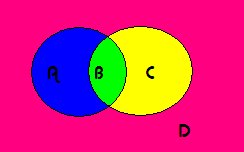So, in math, we're learning about complements. The complement of a given set is anything that's not part of that set. This is the venn diagram which illustrates what the complement is:

In the diagram, the left circle represents everything in group A. Everything not in group A can be defined in three ways. First, you can simply call it "C and D", or you could call it "A complement." The way to write "A-complement" is Ac.
This gets more interesting when you start to assign actual values to the letters. For example, you could say that A represents all the people who ate at Hillel friday night , and C represents all the people who came to shul Friday Night. B would be the people who came to shul AND ate at Hillel, while D would be the people who neither came to shul nor came to eat at Hillel. Ac would be anyone who did not eat at Hillel, regardless of whether or not they went to shul on Friday night .
I find this interesting because when writing down math problems, my professor tends not to write the symbol Ac, opting instead to write a different variable which describes this group, perhaps S for "starved" (in this example, it doesn't quite work because obvously people who didn't eat at Hillel would have eaten somewhere else and would not have starved, but you get the point)
I thought about this today while learning a letter of Rav Kook. In it, he discussed the idea of a culture and a counter-culture. The hippies of the 60's were a counter-culture, a response to the general straight and narrow culture of the time. He talked about non-religous Judaism, and whether chiloni society is a culture or a counter-culture. In other words, do you define non-religous Jews simply as "NON RELIGOUS Jews" or are they something more than that? Are they "my neighbor down the block with the really pretty flower garden " and "That really funny guy in my Biology class", or are they simply "The group of people who are not religous.
Rav Kooks point is that its so easy for religous people to look at the rest of the world and think of them as "Religous-complement" but thats an entirely wrong way of looking at things. A guy I know, "Bobby" is possibly the most insightful person I've ever met. And I happen to know alot of really insightful people. I really value Bobby's opinions on almost everything. It doesn't matter to me that Bobby is not particularly religous-I can still count on him to explain my math work to me, or to shed light on a really complicated sugiyah I'm learning.
So often, we as religous Jews fall into the trap of staying in our own little Jewish circle, and never really branching out beyond that. A friend of mine grew up in an ultra-Orthodox family, went to Ultra-Orthodox schools her whole life, attended an Orthodox seminary in Israel, now is in Yeshivah University, and is getting married soon and moving some Chareidi nighborhood in New York. I'm not judging her particular choices, for her they probably were the best move. However, this girl does not have any real exposure to people who are not exactly like her. And that, in my opinion, is really dangerous. I mean, she could live her whole life never having to really think about why she is religous. And worse, she won't be able to convey that over to her children if she herself is unsure. And then people wonder about the "crisis" of kids going "off the derech." Amazing.
No comments:
Post a Comment